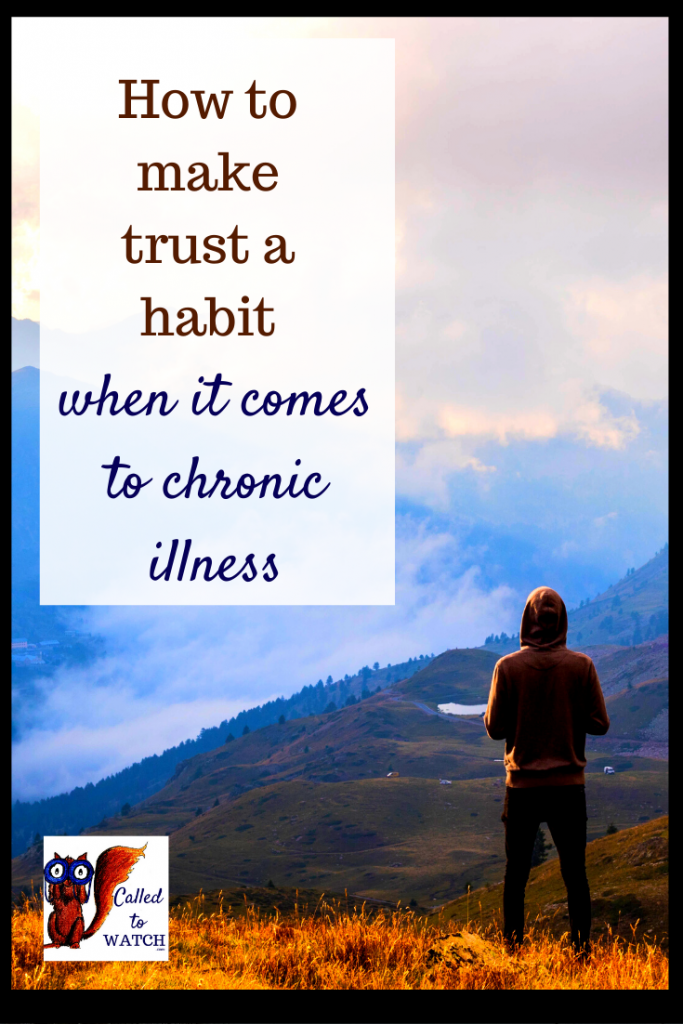Trust. It’s one of the greatest gifts you can give someone, but it’s always costly because there’s never 100% certainty it will end well.
So how do you make trusting your chronically ill friend a habit when there are times you really don’t want to, but you’ve asked yourself the questions and you think you should? Before we explore the answer, let’s brainstorm some scenarios, because trust is never abstract.
It’s hard to make trust a habit when…
Your chronically ill friend..
… is going through a rough patch and you know you should ask how they’ve tried to fix it, and what resources they’ve drawn upon – but really, you think that’s a waste of time since you know exactly what needs to be done.
… wants to go with you to the party and say they’ll be fine – and you are almost positive they won’t be fine and you’ll end up having to leave early to take them home.
… tells you they’re feeling nauseous after eating carrots – and you think it’s all ‘in their head’ and want to roll your eyes every time they bring it up.
As different as these situations are, each prompts the question: will you choose to trust your friend, or will you trust in your own capabilities? You want to make trust a habit… but it’s just so hard. What do you?
How to make trust a habit
1. Ask yourself why you don’t want to
Making trust a habit is hard for all of us, and generally, it’s not something we instinctively choose. But what is it about this particular relationship or situation that you are finding so difficult? Sometimes our pragmatic reason (I’ll save my friend a lot of trouble if I just step in and fix it) is hiding a more subjective motivation (I like feeling in control).
If you’re having trouble trusting, try and voice the specific reason, and check for underlying motivations!
2. Alter your first reaction
It’s easy to get in the habit of cynicism, and assume everyone is lying, exaggerating or incapable of making a balanced decision. This sounds rather dangerous, but it can manifest in subtle ways: an incredulous ‘really?’ when someone tells you something you think unlikely; a quick scramble to find a different explanation when the one we’re given contradicts our assumptions; a disinclination to take someone’s story at face value.
I’m not talking about wisdom vs. gullibility. I’m talking about when our first reaction is to disbelieve someone rather than listen to the end, or ask questions, or to give them the benefit of the doubt.
Sometimes trust is as simple as swapping the ‘Really?’ for a ‘Really? Tell me more.’

3. Make a settled decision
This ties in with the point above. Most of us are not particularly good at trusting ‘off the cuff’. Perhaps, in one sense, that’s wise. But I think it’s important that we sit down and choose to make a settled decision to give as many people the gift of trust as possible.
Why? For me, it’s a way of honouring others as individuals, an exercise of trust in God, and because I want to live in a trusting world.
4. Give up regrets
For all of us there have been times when we trusted and it fell through. Perhaps the person chose to be untrustworthy, perhaps they couldn’t help it, perhaps circumstances outside of our control meant that our gift of trust spawned painful consequences. In light of that, it can be difficult to choose to make trust a habit.
I’m not saying it’s wise to keep trusting someone who has proved untrustworthy in high-stakes situations. I am saying that we can’t base our present decisions on past regrets. This situation is different because it’s here, now, not back then. When we give up trusting everyone and everything because we’ve been duped or disappointed, we hurt ourselves and those around us.
5. Say no to self-protection as a number one priority
This demands explanation. It’s wise to look after ourselves. But that’s different to making self-protection a priority at all costs. When we make self-protection our number one priority, we refuse to trust in any situation which could lead to hurt or pain or discomfort. We might still be willing to trust, but only when we won’t bear the consequences, or, at the very least, won’t bear them alone.
If we protect ourselves like this, we might live a less-painful life. But at what cost? The cost of deep relationships with others and with God, the cost of freedom and the cost of never experiencing the joy which comes from ‘bearing one another’s burdens’ and looking beyond ourselves.
A final word
Trust is hard and failure is common, but the good thing is that opportunities to trust come multiple times a day! It’s never too late to make trust a habit, and in the meantime, we have a good God who forgives us when we choose not to trust out of selfish motivations. He is always trustworthy and always ready to hear us when we need to talk things over.
// What can you do this week to make trust a habit?
Missed my Christmas Gift? To keep in the loop about my upcoming memoir, follow the link below!
PS: Enjoyed the post above? Get the next one delivered straight to you! Sign up for email notifications
I’m also on Facebook, Pinterest, Instagram & Twitter! Meet me there for more interesting reads, resources and community.

